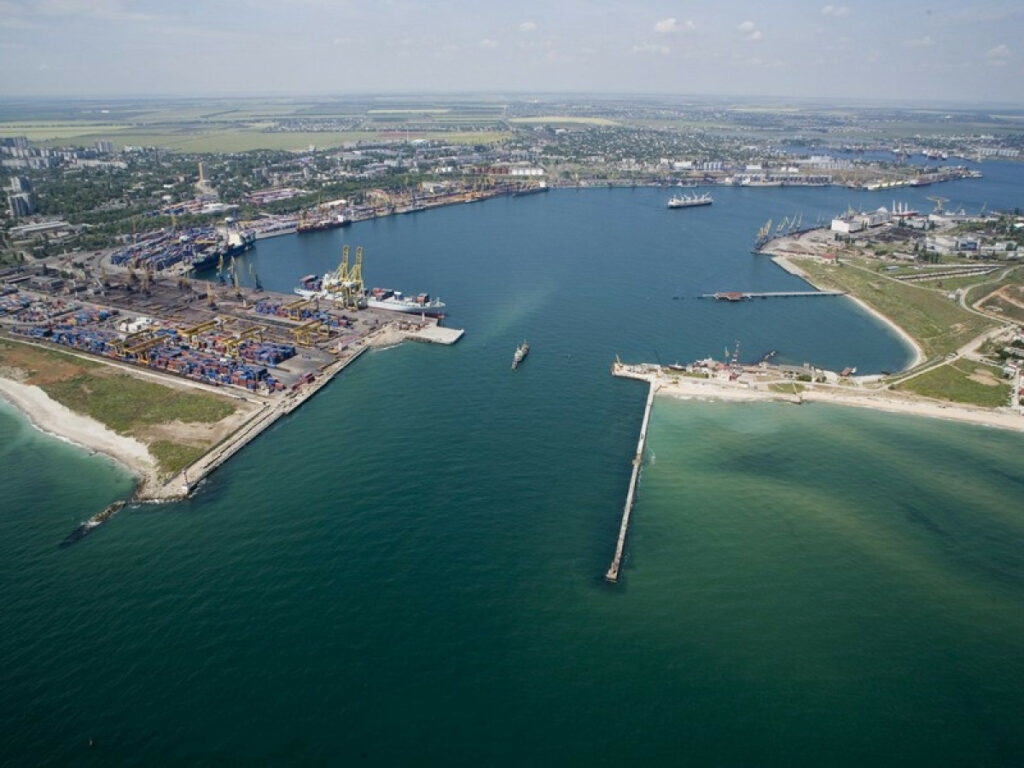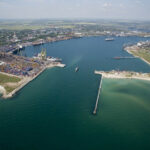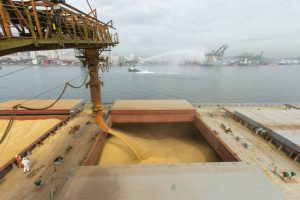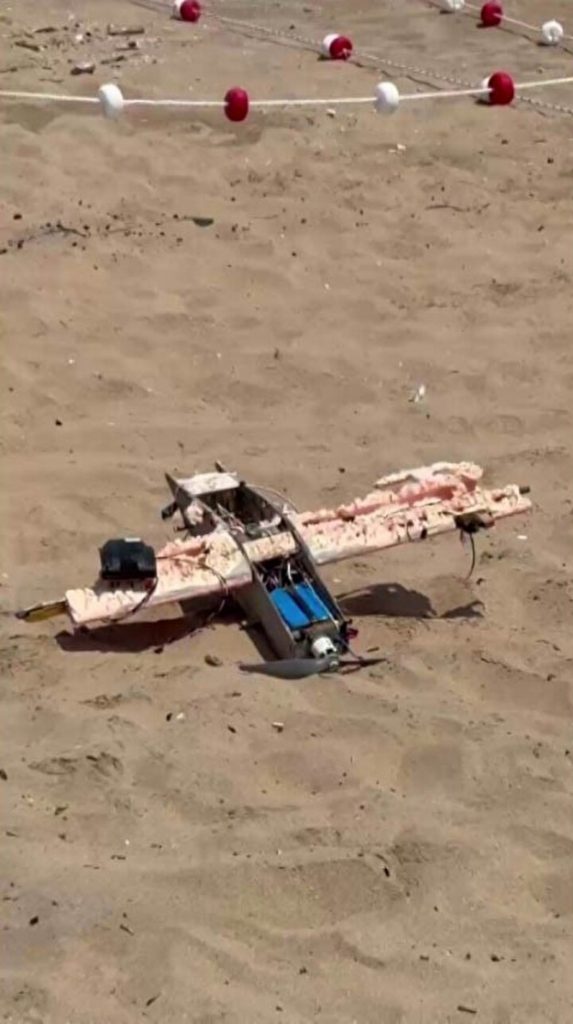What’s wrong with criticism of the Chornomorsk port concession: we analyze fakes and manipulations

In early May, the Ukrainian publication “Telegraf” published two articles on the same day criticizing the terminal concession project in the port of Chornomorsk. Loud statements about the “dismissal of port workers” and “backroom discussions” attracted the attention of other media outlets of a similar nature: the “Fakty”, “Gordon”, UNIAN.
Whether the author of both articles was driven by ordinary ignorance or a more cynical motivation — we do not know. However, we want to explain in an accessible way why such concession statements are fake and manipulated. USM analyzed the manipulative takes from both articles — with the help of Andriy Sokolov, the director of Ukrainian Shipping Magazine.
“The port transfer process is taking place behind the scenes, without public discussion”
“There was one mention of the conference in Warsaw on the Ministry’s website, and the agency did not mention it anywhere else or report on its progress and results. If several experts and bloggers had not written about this event, perhaps none of the officials would have reported on it.”
The presentation of the Chornomorsk port concession project took place publicly at an investment conference in Warsaw on April 24, 2025. The event was attended by more than 20 companies from four continents, including world leaders in the field of port management. The project was prepared with the participation of the International Finance Corporation (IFC) and the European Bank for Reconstruction and Development (EBRD), which ensures transparency and international control over the process.

Presentation of the Chornomorsk port concession project at a conference in Warsaw, April 2025.
At least the Ministry of Development has disseminated information about this conference in all its communication channels, and numerous media outlets (including USM) have told their readers about it.
In addition, the Ministry of Development regularly updates information on the progress of the concession project. Recently, the director of the port of Chornomorsk, Vyacheslav Bezruk, noted that the concession project for the First and Container Terminals is in the final stage of preparation. The property objects that are planned to be transferred to the concession were studied with the participation of international partners. Based on the feasibility study (FEA), a positive conclusion was given on the feasibility of implementing the project.
In addition, international partners participated in the preparation of the project, which ensures openness and transparency of the procedure.
“Ukrainian companies cannot participate in the competition due to discriminatory requirements”
As “Telegraf” itself reports, the concession competition provides for the following requirements for participants:
• 5 years of experience in managing similar or larger port terminals over the past 15 years;
• experience in handling cargo of 180 thousand TEU per year;
• experience in working in an international network of container terminals;
• ownership or management of at least two terminals in two different countries;
• experience in direct or indirect port investments in the construction of cargo-handling infrastructure over the past 15 years in the amount of $50 million and 180 thousand TEU per year;
• ability to invest from $50 million and confirmation of such an amount in a bank account.
“Despite the fact that representatives of Ukrainian companies were present at the conference, these conditions are written in such a way that they will not be able to participate in the concession, since none of them has experience in managing ports in two countries.
On the other hand, foreign companies hardly need our people, regardless of whether they were at the front line or worked in Chornomorsk all their lives or are specialists in their field.
In addition, the conditions for participation in the concession competition, which were agreed upon by the Ukrainian Ministry, look discriminatory in relation to Ukrainian business, which, nevertheless, has some experience, attracts port dues, and also survived and is still experiencing Russian attacks, losing people and money, but despite everything continues to work in Ukraine, and did not relocate, let’s say, to Romania.
Requirements for potential concessionaires, such as experience in managing at least two terminals in different countries and annual processing of 180,000 TEU, are standard for international concession projects. This ensures the attraction of experienced operators capable of effectively managing port infrastructure and attracting investments.
This is not about discrimination, but about the standard of international concessions, so that the investor has the experience, funds and resources for long-term modernization. These requirements are similar to those that were in the successful concession in the ports of Olbia before the full-scale war, which were public and aroused interest precisely from international operators.

Olbia port
And, of course, the theses about “discriminatory” requirements for Ukrainian companies are supported by emotional coloring about “people on the front lines” and businesses that “despite everything, continue to work in Ukraine.”
According to Andriy Sokolov, the rules and restrictions for concessionaires provide, on the one hand, for the selection of a suitable operator so that he brings investments and experience. On the other hand, they exclude the possibility that the competition will be registered for a specific local company.
“Local companies usually participate in collaboration with foreign ones that meet the criteria. At the same time, foreigners, as local partners, insure local risks, and local companies gain access to the competition. This reminds me of the EBRD/IFC competitions for the development of feasibility studies — there are also criteria for consulting companies that no Ukrainian company will pass. But they participate in collaboration with those who meet the criteria,” he explains.
As for the ferry complex, most likely, the competition for it will have the same conditions of management experience of at least 5 years and the corresponding cargo flow. Ukrainian companies have no experience in managing ferry complexes, not counting the cargo-passenger one in Orlivka, which has a different format.
“A cargo turnover of 180 thousand TEU is half the capacity of one feeder berth per year. This is an adequate condition,” the USM director noted.
“A concession is a hidden privatization”
A concession is a form of public-private partnership, under which the state transfers the right to manage an object to a private investor for a certain period of time, while retaining ownership. In the case of the port of Chornomorsk, the concession provides for a 40-year management period with mandatory investments in infrastructure and preservation of state control.
As noted by the Ministry of Development itself, the concession aims to ensure the optimization of the use of terminals and assets of the port of Chornomorsk. Namely, to increase the use of underloaded terminals and port assets, to increase their operational potential through access to private investment capital, private sector management experience and high commercial flexibility.
“Concession terms not published”
“But the conference organizers, including the EBRD and IFC, officially warned the participants that everything they said there was not a final offer, and the information provided was not accurate, it was only indicative. Obviously, we will learn about the real financial terms of the tenders only when the competitions are announced.”
This is standard practice for investment presentations: before the official tender, all terms are preliminary. That is why the term indicative is used. The final terms are published together with the tender announcement, as in previous concessions.

Meeting of the Ministry of Development team with the delegation of the International Finance Corporation (IFC).
“Employees will be laid off, social guarantees are not provided”
“As it turned out, the future concessionaire should increase the number of employees to 1,240. Now, the port has 40 administrative employees, whose average salary is 10,000 hryvnias (250 USD) per month. Another 110 are protected from dismissal or reduction due to the fact that they are drafted into the ranks of the Armed Forces of Ukraine. All of them, of course, should receive official contracts with the new concessionaire, insurance, but in general, working conditions after the port is handed over to the concession should become “no worse than they were” — not better, not average for the country, not market, but precisely not worse (i.e. they can be exactly the same). And reductions and dismissals cannot be carried out only for the first 5 years (the concession term, by the way, will be 40 years). In other words, those who, for example, return from the army will receive the same 10 thousand and are predicted to be dismissed themselves due to the paltry salary. In addition, the future concessionaire will have the right to send employees to early retirement.”
It’s interesting, what facts the author’s opinion is based on. The concession project requires hiring at least 1,240 people. This is significantly more than the current number of people working in the port (about 150). This is workplace creation, not reduction.
In addition, the concessionaire is obliged to provide social guarantees for employees, including compliance with the collective agreement and social protection.
Guarantees, such as a ban on dismissal for 5 years, are a protective norm, not a restriction. And “early retirement” is a standard wording in labor law for heavy industries, and there is no question of forced “expulsion”. But the author expects that his readers will read the emotional message and not understand what the situation really is.
Andriy Sokolov noted: the exact distribution of people is expected to be in two terminals is unknown. But there should be a lot of people at the ferry complex and the car terminal. Most likely, these conditions are related to the demands of trade unions – that all existing employees transfer to work for the concessionaire.
“The concession makes no sense because the two previous ports are not working”
Comparison with Kherson and Olbia is not relevant. These ports are not working because of their proximity to the front line and temporarily occupied territories, and not because of the concession itself. The port of Mykolaiv has also not been working since the beginning of the full-scale invasion of the Russian Federation, even without a concession, because Russian troops will fire on civilian ships and crews in the region as soon as they get the opportunity.
The conditions in Chornomorsk are different now: the port is working, there is a request for development and investment, and Ukraine has the support of international financial institutions (IFC, EBRD) for this deal.
Ukraine must build the infrastructure of the future even during the war. This is an investment in post-war reconstruction.

The Turkish ship “Kuruoglu-3”, which was hit by Russian missiles. Kherson port, February 2024.
“And once again, Kolomoiskyi”
“That is, even before the previous tenant left the port, the authorities began to look for a new one. Perhaps the fact is that LLC “ChRP” has a connection with Ihor Kolomoisky, who is currently being pursued by the authorities and who was removed from almost all state-owned companies from which the oligarch earned money, such as the state-owned “Ukrnafta”.”
The author describes the court cases against Kolomoiskyi and the previous operators at length and without any connection to the topic, although the concession of the port of Chornomorsk has no direct relation to them. The current concession process is not related to the previous tenant, whose assets are under arrest. The court process does not affect the possibility of transferring other terminals.
But, of course, sometimes it is enough to add the name of an odious character to a large text to convince readers that “everything is definitely not clear here.”
“Why doesn’t the state run the port?”
“And finally, why can’t Ukrainian Sea Ports Authority, which is the organization that should manage state ports, perform the same functions that it assigns to concessionaires? The obvious answer is due to the lack of funds for investment. However, we have other examples of state-owned companies being successful and profitable – Naftogaz of Ukraine and Ukrposhta.”
Is it correct to compare Naftogaz of Ukraine and Ukrposhta with the Sea Ports Authority, which has lost five ports in Crimea since the beginning of the war, and three more ports after February 24 (not counting those that cannot operate due to danger)? Despite the fact that the author himself at the beginning of his article described the situation with the sea ports of Ukraine after the start of a full-scale war, but with the aim not to show the real state of affairs, but to thicken the story about “transferring the port of Chornomorsk to private individuals.”
Indeed, in conditions of full-scale war, the state does not have the funds for the infrastructure modernization of terminals. That is why the optimal form is a concession: the state remains the owner, but does not spend budget funds. Ports in many countries (Greece, Poland, the USA, Egypt, etc.) are managed through concessions – this is the international norm.

The port of Piraeus in Greece, whose berths are under the concession of the Chinese COSCO Shipping
A bit about the problems of the concession
So that our article does not look complimentary, let us also mention the problems of concession in Ukraine. They exist, but the media, whose only goal is to sow treason, for some reason do not know about them.
Andriy Sokolov reminded that currently the berths in the port of Chornomorsk require investment due to their condition. Whether the investor will do anything about it depends on the term of the concession. But repairing the berth, if it is transferred to the concession, is a normal practice.
“About 50 million in the account — it is quite controversial, if it is true. Confirming the possibility of investing at the expense of your own funds or borrowed funds — yes, but this can be done in various ways, except for freezing them and keeping them in the account. Large companies may have a reserve of working capital, etc., or retained earnings. But the requirement to confirm this with “live” money in the account is not reasonable,” Sokolov noted.
The question remains open as to how justified the concession is now, given the ongoing war and, accordingly, the list of interested investors who will want to participate in the competition.
“And here, perhaps, it is worth thinking about who can benefit the most from the lack of great competition in the competition, the conditions of the competition that are not overheated by economic growth and competition, and also for whom the risks in a warring Ukraine are not so terrible. These will be those who have already “buried in concrete” more than one dozen million dollars in Ukraine with the appropriate profile of activity.
But in this case, too, there is no instruction. Maybe they will set an example to others that it is possible and necessary to invest in Ukraine, even during the war,” Sokolov concluded.





